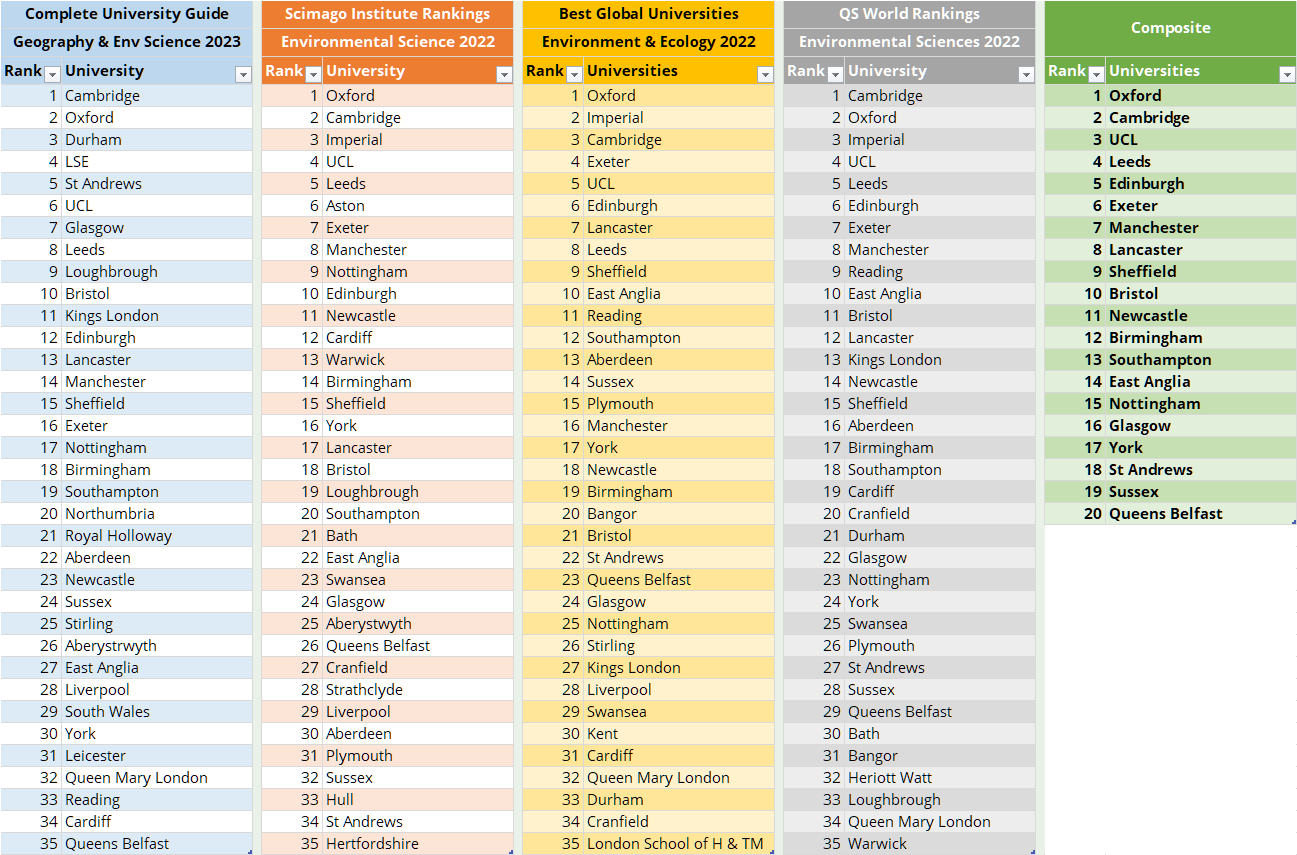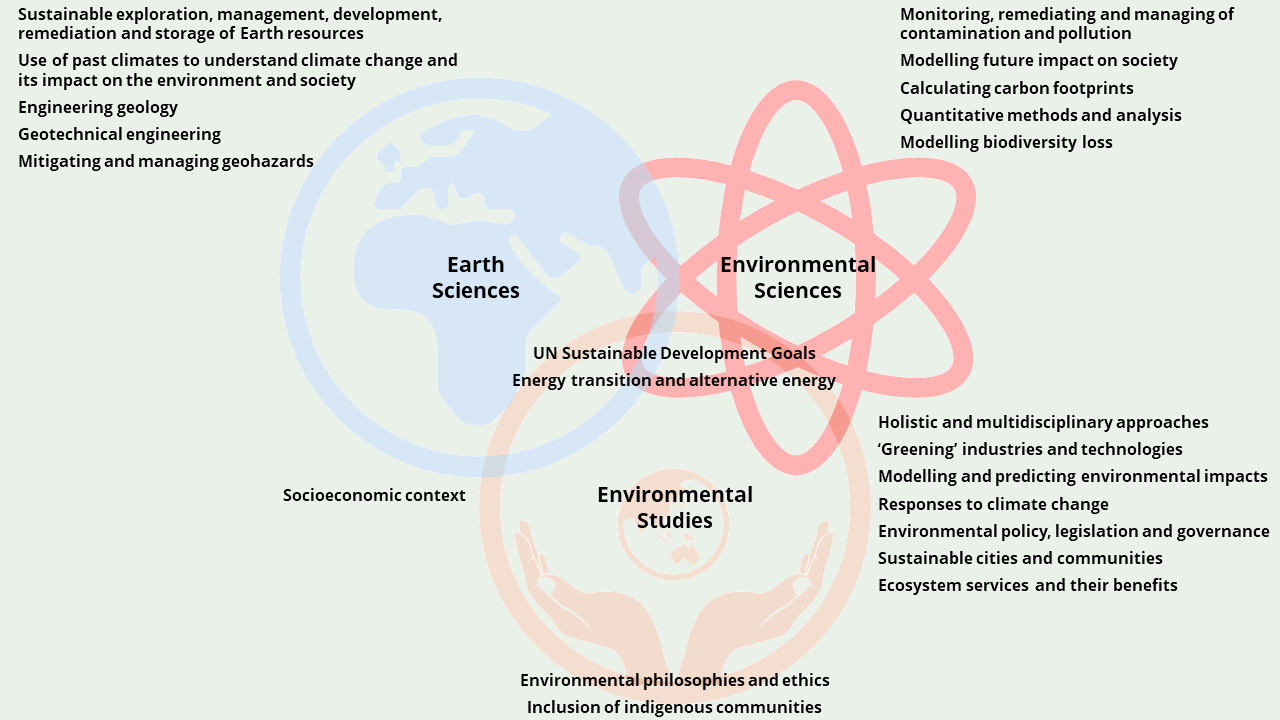The ES3 environment
Thinking about a degree in Earth Sciences, Environmental Sciences or Environmental Studies? We take a look at some of the things to consider.
Here at Blue Mirror Insights we’ve been in and around the careers world for some time now. Back around 2016, we were proud to contribute to DfE’s original blueprint for IfATE’s occupational maps. And these days, while most of our time is taken writing The Green Edge, we do continue our day jobs when we’re invited, including a recent input to the forthcoming IEMA Green Careers Hub.
We were contacted recently by a subscriber, asking about career options for ES3 (Earth Sciences, Environmental Sciences and Environmental Studies) graduates. In looking into this, we noted from Samsung’s recent survey that ‘two thirds of young Brits say they would pick purpose over wage in their career and over a third would never work for a company that did not have purpose at its heart’1
81% of Gen-Z want to devote their future occupation to solving environmental and societal issues with 95% admitting they are concerned about the future world
Source: Samsung UK
While ES3 topics are partly covered in most UK schools between Years 10 and 13, we’ve observed previously on The Green Edge that the number of students taking the Environmental Science A Level is relatively low, despite it being specifically mentioned in the Net Zero Strategy. So why would Gen-Zers want to take an environmental-something degree at university? Well, we see a number of reasons: work should never run out; it affects the whole of society; it’s a career with purpose; and it directly helps communities, especially those hit hard by the transition to Net Zero. To name but a few.
And there are several career pathways, which we’ll come on to later. But be careful – with a particular ‘flavour’ of environmental degree it may be easier to move between pathways in one direction than in the other. So, choose your starting point well depending on your talents and what you might want to do afterwards. Environmental Science vs Environmental Management, for example? Here’s one perspective on how to distinguish between the two:
Image: University of Melbourne
Setting our field of view a little wider, we see universities in the UK offering teaching and research across a whole range of green-related subjects. HESA and ONS data for the UK in 2019/20 shows the average number of students on green-related degree programmes running at around 8.5 students per 1,000 residents. We also see lots of good universities offering good environmental courses. Below is our (very unofficial) composite ranking, which we pulled together from four separate sets of rankings on individual ‘green’ bachelor programmes.
So, which course to choose? Well, there’s a bewildering array and it’s certainly not our place to make recommendations. We’ve already mentioned Environmental Science and Environmental Management, plus the courses in the table above, but there’s lots of others out there. Affordable Colleges online – a US resource – adds Environmental Architecture and Design, Environmental Engineering, Environmental Health Sciences, Environmental Law, Horticulture, Marine Sciences, Energy, Sustainable Agriculture, and Wildlife Ecology. On top of that, we can add programmes we’ve posted about in the past on The Green Edge, including multi-disciplinary degrees from London Interdisciplinary School (LIS) and business-related masters programmes from Imperial Business School. The list continues.
Another thing to look at is which professional bodies have accredited each degree programme. There are quite a few here – The Institution of Environmental Sciences (IES), The Chartered Institution of Water and Environmental Management (CIWEM), The Geological Society, The Chartered Institute of Ecology and Environmental Management (CIEEM), and The Institute of Environmental Management and Assessment (IEMA), among others. Looking at IES as an example, it recognises 109 degree programmes across 54 institutions (51 of them being in the UK) representing over 1,900 students.
But we digress. Going back to ES3 - Earth Sciences, Environmental Sciences and Environmental Studies, if you remember - what types of knowledge and skills would graduates expect to offer to start their careers for a sustainable world? Well, as usual, the Benchmark Statement from the QAA provides a ton of bullet points on the subject. You might read that at your leisure, but for now, in the (possibly misguided) assumption that a picture tells a thousand words, here’s our own Venn diagram of some of the key competences you might expect.
Image: BMI adapted from QAA benchmark (click to download as pdf)
So much for competences, but what about actual careers? Well, an IES survey of graduates from nine entry degree programmes found between sixteen and nineteen main environmental career pathways, while the Prospects website lists 20 career options for environmental science alone. Entry jobs exist in many fields, including land condition, air quality management, environmental management, waste management, the built environment, conservation and ecology, impact assessment, energy, acoustics, education and training, hydrology, marine and coastal science, transport, sustainability, climatology, archaeology, forestry and landscape. In the final analysis though, the environment might be seen as being wrapped around almost every occupation involved in manufacturing and trading products and services, as well as in managing the environment itself.
Quite rightly, we think.
Sponsor The Green Edge
To keep The Green Edge free to subscribers, we’re asking for sponsorship. Your sponsorship may be linked to a specific piece of content, a steer you would like to give us, or simply in recognition that we’re adding value to the green economy conversation. It could a one-off contribution or in more regular instalments. At whatever level, your support will be much appreciated.
To talk to us about sponsorship, please contact us via email by clicking the button below. Thank you.
With a slightly sceptical hat on, we suspect that a majority of late Baby Boomers and early Gen-Xers would have said the same thing. It would be interesting to get their views on how that turned out.










Good comment Mary. We have featured both UCL and LIS with their truly multi-disciplinary degree programmes, and the work at LJMU and the OU on systems thinking as well. We agree there needs to be a bringing together of the "traditional" environmental programmes with multi-disciplinary ones. When we pulled together a series of four ranking of environmental programmes to produce a single table it excluded programmes at Imperial College amongst other universities.
I wonder whether the filter you have used ie Environmental Sciences has resulted in a failure to recognise alternative courses that work in interdisciplinary or transdisciplinary ways - eg the BASc programmes offered by UCL, LIS and Brunel University's Global Challenges programme - particularly the Planetary Health pathway. The Brunel University London programme has won the National Green Gown Award for Next Generation Learning and Skills but it wouldn't be picked up by the filters you are using.